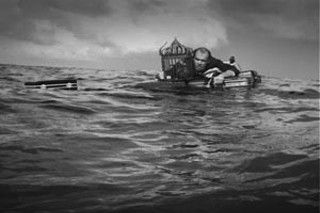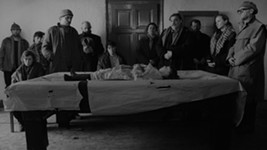Into Thin Air
The already under way adventures of Austinites at the Dances Sun and Slam, and what they might mean for the local scene
By Spencer Parsons, Fri., Jan. 21, 2005

In New York, former Austin resident Jay Duplass settles into that special corner of his apartment where a cell phone actually works to give an interview for this article, but my first question is cut off by a more important call. The post-production house finishing his feature, The Puffy Chair, to High Definition video is encountering some difficulties (and they're the second facility now to work on it). When he catches up with me some time later, he jokes, "Good thing I was already in that spot to talk to you or my phone might not have picked up that call!"
In Austin, Kyle Henry's phone awakens him at 1am. It's Kreg Lauterbach from Match Frame in San Antonio, calling to report that 21/2 weeks into an HD transfer of Henry's Room, originally scheduled for four days, "It's finally working." Heroically laboring around the clock to resolve all manner of compatibility problems between nonlinear editing platforms, crunching codecs, and exorcising digital demons, he worries about waking the director. After all, Henry will spend the next morning and early afternoon in San Antonio working with him on the feature's picture, then drive back to Austin for sound mixing. But the news is good, and by now he's been working on Room long enough to really feel like one of the crew. Welcome to the family.
Of course, there's nothing new about filmmakers struggling to get prints ready in time for Sundance, and nothing remarkable in discovering that the faster, cheaper technology revolutionizing filmmaking (again) will deliver on its promise at a higher-than-anticipated human cost of time, energy, and lost sleep. But the number of Austin-based and Austin-bred filmmakers taking their work to Park City this year is something, building upon a remarkable presence in 2004.
At Sundance, Henry's Room and Duplass' The Puffy Chair are playing in the Frontier and American Spectrum feature selections, respectively. Luke Savisky takes his feature-length live projection performance Film Action V to Frontier, while among the shorts are David and Nathan Zellner's "Flotsam/Jetsam" and John Bryant's "Oh My God!" Over at Slamdance, the shorts include Courtney Davis' "Milton Is a Shitbag" and Melissa Henry Pratt's "Below the Break," as well as another by the Zellners, "Foxy and the Weight of the World." Then, in the Sundance Documentary Competition, there's Reel Paradise, concerning the Fijian adventures of John and Janet Pierson (along with children Georgia and Wyatt), so recently transplanted that they wouldn't count if they hadn't already been intimately involved in Austin filmmaking for some 15 years before submitting fully to its gravitational pull.

Now, if I'm the first one to tell you that Austin is supposed to be among the very best cities for independent filmmakers, then you must not have been reading the Chronicle (and welcome!). But to start, let's set aside the uncommon group of heavyweights (Linklater, Rodriguez, Judge) who regularly produce work here and skew the curve. Austin's reputation for nurturing emerging talent has long been borne out in something like a small but enviably steady stream of shorts, documentaries, and occasional features to screen or broadcast in venues of national and international prominence, but we've gone a while without a confirmed, up-from-below breakout on the order of Slacker, El Mariachi, or Beavis and Butt-head.
And let's not kid ourselves: Even though Austin's community produces all kinds of work, when most people ask whether to believe the hype, they're asking whether we're really producing films that will play commercial theatres nationally or at least rate slots on Blockbuster's "Cult" shelf. Or else they're asking whether Austin's industry can sustain careers. Tough questions. And as The New York Times this week prints yet another Sundance-keyed story about how filmmaking is so impossible you might as well give up now, and the Village Voice runs one asking if opposition to our own George W. is fueling an indie renaissance, they're pretty urgent questions, too.
So, as the dances provide among the best shots at breaking out, it's a great moment to celebrate ... and also to stop and take our temperature. There is something remarkable going on, but it's fair to ask what has been at work to make this happen, and assuming it's not some sort of momentary fluke or the end of a cycle, how these filmmakers and others in Austin will best be able to continue the motion and make good on the promise.
Truth be known, Jay Duplass is not an Austin filmmaker anymore, but he might be an exception that proves the rule. Two years ago, his short "This Is John" was warmly received at Sundance, netting him representation at the William Morris Agency. The logical next step seemed a move to New York for connections that would help move forward to greater projects. But while he could, for instance, go to parties and meet more industry players than he had been able to chase down in Austin, getting a film made was something else again.

"You know, it's very expensive to live here in New York, and I have to justify it to myself weekly," he says. "The reality is that it's much harder to make films here. We actually go to small towns to make them. ... To make The Puffy Chair, we had to call on all the resources and people that we knew. And most of them came from Austin."
So John Bryant, among others, flew up to Maine to crew on the film. And conversely, it was Duplass who lent him the 16mm camera package to shoot "Oh My God!" Needing help with some special effects and a place to build a key set, Bryant turned to the Zellner brothers, who manned the blood pump and let him use their garage as a studio. But then John's the director of photography on the Zellners' "Foxy and the Weight of the World." If you throw in what might be the Kevin Bacon of Austin film, Bryan Poyser and Jake Vaughan's Dear Pillow, to which the Duplasses lent production support and David Zellner his voice as one of the phone sex guys, then everybody going to Park City this year can be linked within about two or three degrees of separation.
That Bryant, the Zellners, the Duplasses, Poyser, and Vaughan all originally met through production courses in the Department of Radio-TV-Film at UT is not incidental, and in fact, with the exceptions of Luke Savisky and John Pierson, all of these filmmakers took classes there and cite their creative partnerships with other students as the most positive and enduring aspect of their experience with the program (and now Pierson's on the faculty). Similarly, Savisky says his ongoing connection with mentor Bill Lundberg of UT's TransMedia program, collaboration with bands like Stars of the Lid and the now-Chicago-based Poi Dog Pondering, as well as the support of a veritable who's who of Austin filmmakers and artists, have helped keep his own creative fires burning here for the past 20-odd years. And, oh yeah, he's in Slacker. So, the thing is, we can throw those heavyweights back into the mix, since they're hardly insulated from the scene and have all done their part to make Austin a better place for the little guy, not least of which was Linklater's creation of the Texas Filmmakers' Production Fund with the Austin Film Society.
But if it is easier to make films in Austin than in a lot of other places, that doesn't mean that there aren't hidden costs, just as with the technology that has made things easier ... while at the same time causing innumerable new headaches. So an important thing to know is that in fact Kyle Henry, Courtney Davis, the Zellner brothers, and the Duplass brothers have all gone down the road to making features at least once before, encouraged by how much easier it seemed to pull off here. But these experiences, while mostly positive, have also proven tremendously tiring in production and frustrating in distribution. At some point, when you're working on projects that size, resources, and support, however bountiful, can be exhausted. Conventional wisdom may get hung up on commercial features, but it's more complicated than that.
"On Plastic Utopia [1997] and Frontier [2001], we didn't have big festival runs," David Zellner notes. "And those movies were made with nothing. For the next feature, we would like to do something with a real budget, so we've been doing these shorts in the meantime that aren't as big a risk. ... And the great thing about having so many peers here is that we've been able to really step up the scale of these little projects in a way we might not have been able to otherwise."

Courtney Davis concurs, explaining that from the beginning there has been much more interest in her four-minute cartoon than in her feature, My Name Is Buttons (2003). The power of the short shouldn't be underestimated. The Duplasses not only got a foot in the door at Sundance with "This Is John" in 2003 and followed up with "Scrabble" in 2004, but their experience screening the work encouraged them to change direction from the feature ideas they had been working on.
"We had these very elaborate movie-movie kind of ideas before," Jay says. "But when we saw what it was that people were responding to in these shorts, this more personal thing based on relationships, we changed gears. We hatched the idea for Puffy Chair at Sundance, and here we're showing it a year later."
If that speed resulted in large part from ties to Austin, then there are benefits for filmmakers here who connect with the coasts. Kyle Henry moved to New York in 1999 and returned in 2001 to work on the long-simmering Room, which takes place in New York and Houston. To his mind, even beyond the issue of location, a movie like this wouldn't have been possible without the help he received in both cities.
John Pierson's take is that "in terms of a vibrant independent film industry, Austin's got it above and beyond everyone else, but that doesn't mean that it's a stand-alone viable community that can do it without connection to the majors. ... You know, things go in waves, and I think it's time for another surge of filmmakers and film industry types from outside who haven't been here yet. There's always a worry about carpetbagging, but it also keeps the machine whirring."
And there's nothing to say that it can't go both ways. Henry relates that receiving TFPF money got the ball rolling and emboldened him to approach the Seventh Floor in New York, for whom he had edited Eric Eason's Manito (2002). Not only did they lend office space and help him procure financial support from Michael Stipe and Jim McKay's C-Hundred for production, but since Room was accepted to Sundance, they have sprung into action to represent the film as he finishes it.
"What happens when you get to a top-tier festival, the infrastructure for the press packets and material that Sundance requires is something I've never experienced and that I couldn't just ask friends for help with," Henry says. "Just this morning, we got a request from the BBC for clips, and I'm trying to get the thing mixed. At this point, it's impossible to keep doing it as a one-man-band or small Austin self-produced kind of thing, because you'll lose the opportunity to maximize the film's potential."
And whether any of these films walk away with distribution or not, it is essential that potential be maximized, to send their makers away with more than an enviable credit for their résumés. In practical terms, they need for this gamble to pay off in making their next projects easier to launch, hopefully on budgets that can pay their crews. But as suggested by the origins of The Puffy Chair at last year's Sundance, a great deal of the potential for these films simply lies in the responses of the people who watch them.
Luke Savisky has had an odd time explaining to distribution agents who call how he will be making his "film" on site, with multiple projectors and loops of 16mm and super-8. Nevertheless, he reports that while it quickly becomes clear that what he does isn't conventionally marketable, they seem to get excited anyway. "Every one of these screenings will be rewarding in some way, because you are dealing directly with your audience," he says. "There are many ways to do it. ... You just have to use as much imagination getting your movie out there as in making it." ![]()
The Sundance Film Festival opens today, Thursday, Jan. 20, and runs through Jan. 30. Meanwhile, the Slamdance Film Festival runs from Friday, Jan. 21, through Jan. 28. For Marjorie Baumgarten's report from Park City, see next week's Chronicle.
We should tell you that Spencer Parsons is a filmmaker, UT Radio-Television-Film lecturer and graduate, former senior programmer of Cinematexas, and former housemate to Jacob Vaughan. He has collaborated with Kyle Henry on past projects, advised Melissa Henry Pratt on "Below the Break," frequently pestered John Pierson with dumb questions, and drunk beer with others discussed in this story.








